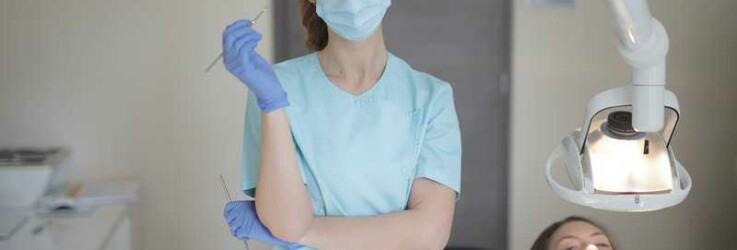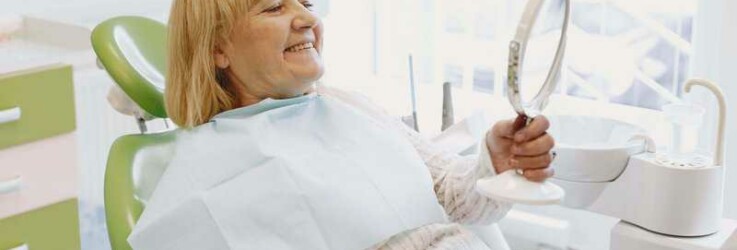Blog
How Often Do I Need Dental X-Rays?

Maintaining optimal oral health goes beyond just brushing and flossing; regular dental check-ups play a crucial role in preventing and addressing potential issues. One integral aspect of these check-ups is dental X-rays. But how often should you get dental X-rays and why are they such an important part of your routine dental exam?
The Role of Dental X-Rays
Dental X-rays, also known as radiographs, are diagnostic tools that provide valuable insights into areas of your mouth that are not visible to the naked eye during a regular dental exam in Douglasville. These images help dentists identify various issues, including cavities between teeth, bone loss, impacted teeth, and even tumors.
Frequency Guidelines
The American Dental Association (ADA) recommends that how often a patient gets dental X-rays depends on their oral health, age, and risk factors. For most adults, a set of bitewing X-rays every 18 to 36 months is typical. However, your dentist may suggest more frequent X-rays if you have a history of dental issues or are undergoing specific treatments.
Children and teenagers, whose teeth and jaws are still developing, may require X-rays more frequently to monitor growth and development. Typically, X-rays are recommended every 6 to 24 months for this age group.
Advanced Technology: Digital Dental X-Rays
Advancements in technology have allowed dentists to use state-of-the-art digital dental X-ray technology to enhance patient care. Digital dental X-rays in Douglasville offer numerous advantages over traditional film X-rays, including reduced radiation exposure, faster image processing, and enhanced image quality.
With digital X-rays, the amount of radiation exposure is significantly lower compared to conventional X-rays, making them a safer option for patients. This technology also allows for instant viewing of images, enabling dentists to diagnose and address issues promptly.
Moreover, digital X-rays contribute to environmental sustainability by eliminating the need for traditional film development chemicals.
Dental Exams Are The Gateway to Optimal Oral Health
While dental X-rays are a vital component of routine dental exams, they are not the only focus. Regular dental exams involve a comprehensive assessment of your oral health, including a thorough examination of your teeth, gums, tongue, and other oral structures. In addition to digital dental X-rays in Douglasville our dental exams encompass preventive measures, such as professional cleanings, oral cancer screenings, and guidance on proper oral hygiene practices.
Understanding how often you need dental X-rays and why is an essential aspect of maintaining your oral health. Regular dental exams, complemented by advanced digital dental X-rays, provide a comprehensive approach to preventive dental care and early detection of potential issues.
Prioritize your oral health by scheduling routine dental check-ups, and let our team of dedicated professionals guide you on the path to a healthy and confident smile.
What Does The Hygienist Do When They Clean Your Teeth?

Visiting your dentist in Douglasville for a routine teeth cleaning might seem like a straightforward procedure, but behind the scenes, dental hygienists work diligently to ensure your oral health is in top-notch condition. But what exactly does the hygienist do when they clean your teeth?
The Pre-Cleaning Assessment
Before the cleaning begins, your dental hygienist performs a thorough assessment of your oral health. This includes reviewing your medical history, checking for any changes in your overall health that may impact your dental treatment or oral health, and discussing any concerns or issues you might be experiencing.
Once the assessment is complete, your hygienist will start examining your teeth and gums. They use specialized tools and mirrors to identify areas of concern such as plaque buildup, tartar deposits, and signs of potential gum disease. This initial evaluation serves as the foundation for developing a personalized cleaning plan tailored to your specific needs.
Plaque and Tartar Removal
One of the primary tasks of a dental hygienist during a teeth cleaning is the removal of plaque and tartar. Plaque, a sticky film of bacteria, accumulates on teeth surfaces and, if not adequately removed, can lead to cavities and gum disease. You can reduce plaque buildup by regularly brushing and flossing at home. Tartar, however, is a hardened form of plaque and needs to be removed by a hygienist.
To address these issues, dental hygienists use tools like scalers to gently and carefully scrape away plaque and tartar from the surfaces of your teeth. They’ll pay particular attention to areas that may be more prone to buildup such as the gumline and between teeth. This meticulous process helps prevent the progression of dental problems and promotes optimal oral health.
Polishing for a Gleaming Smile
After the removal of plaque and tartar, your dental hygienist takes the extra step of polishing your teeth. This not only enhances the aesthetic appeal of your smile but also serves a functional purpose. Polishing helps smooth out the tooth surfaces, making it more difficult for plaque to adhere and accumulate in the future.
A specialized dental polishing tool, coupled with a mildly abrasive polishing paste, is used to gently buff away surface stains and irregularities. This leaves your teeth feeling smooth and looking radiant, contributing to an overall refreshed and clean sensation.
Education and Oral Care Guidance
Beyond the physical cleaning process, dental hygienists play a crucial role in patient education. They take the time to provide valuable information on proper oral hygiene practices, including effective brushing and flossing techniques. They may also offer insights into dietary habits that can impact oral health and recommend specific oral care products tailored to your needs.
During this educational phase, dental hygienists empower patients to take an active role in maintaining their oral health between dental visits. Whether it’s emphasizing the importance of regular flossing or suggesting the use of certain products, these insights contribute to the prevention of dental issues and the longevity of a healthy smile.
In the realm of oral health, dental hygienists serve as unsung heroes, meticulously working to keep your teeth and gums in optimal condition. The process of teeth cleaning involves a combination of assessment, plaque and tartar removal, polishing, and patient education. The expertise and care provided by dental hygienists not only contribute to a sparkling smile but also play a vital role in preventing future dental problems. So, the next time you sit back in the dental chair for a cleaning, appreciate the intricate artistry involved in maintaining your oral health.
If it’s been longer than six months since your last dental cleaning, schedule an appointment with a dentist in Douglasville near you.
What Does a Cavity Look Like?

Taking care of your oral health is essential to maintaining a healthy, radiant smile. As your trusted Douglasville dentist, we understand the curiosity, and often confusion, that surrounds oral health. One of the most common ailments and areas of question revolves around cavities. What causes them? How can you tell if you have one? What’s involved in treating a cavity? Let’s find out.
What Does a Cavity Look Like?
Your dentist in Douglasville believes in empowering patients with knowledge about their oral health. One common question we encounter is, “What does a cavity look like?” Some of the noticeable signs of a cavity include:
- A hole or damaged area on the surface of a tooth
- Discoloration such as dark spots, ranging from light brown to black
- Tooth sensitivity, especially when eating or drinking something hot or cold
- Pain when chewing
- Persistent bad breath
If you notice any of these signs, schedule an appointment with a dentist near you as soon as possible.
How Do Cavities Develop?
Cavities, also known as dental caries, are caused by the accumulation of plaque – a sticky film of bacteria – on the teeth. When sugars and carbohydrates in the food we consume interact with these bacteria, acid is produced. Over time, this acid erodes the enamel, creating a cavity.
The Importance of Early Detection and Prevention
Early detection of cavities is key to preventing further damage and maintaining optimal oral health. Regular dental check-ups and cleanings are your first line of defense against cavities. During your dental visit, your dental team will conduct a comprehensive examination, using advanced diagnostic tools to identify cavities early on, before they have a chance to cause more serious problems. Digital X-rays and visual inspections allow them to assess the extent of decay and formulate a custom treatment plan if needed.
How Are Cavities Treated?
Cavities are commonly treated through a quick dental procedure. Your dentist begins by numbing the affected area with a local anesthetic to ensure a painless experience. Using a drill or laser, the decayed portion of the tooth is carefully removed, leaving a clean and prepared surface. Once the decay is removed, your dentist fills the cavity with a suitable material such as dental amalgam or composite resin. This filling restores the tooth’s structure and prevents further decay. In more advanced cases, a crown may be placed to strengthen the tooth.
How to Prevent Cavities?
Maintaining a diligent oral hygiene routine is crucial to preventing cavities. Brushing teeth twice daily helps remove plaque and bacteria, reducing the risk of decay. Flossing daily is equally important, as it removes debris between teeth that a toothbrush might miss. Limiting sugary and acidic foods and drinks can also protect teeth, as these substances contribute to enamel erosion. Instead, choose a well-balanced diet rich in calcium and phosphorus to help strengthen teeth and prevent cavities. Additionally, regular dental check-ups with your Douglasville dentist, ideally every six months, allow for professional cleaning and early detection of potential issues.
If you haven’t seen a dentist in more than six months, we welcome you to schedule an appointment and take the first step towards a cavity-free future. Your radiant smile awaits!
How Dental Veneers Can Make Your Teeth Look Better

As we ring in the New Year, many of us find ourselves reflecting on the past and contemplating ways to enhance our lives in the coming year. One common resolution that often tops the list is the desire for self-improvement, and what better way to start fresh than by transforming your smile through cosmetic dentistry with your dentist in Douglasville? If you’ve been longing for a radiant and confident smile, now is the perfect time to consider the transformative power of cosmetic dentistry, particularly with the help of veneers.
The Desire for Change
The dawn of a new year brings with it the promise of new beginnings and the chance to redefine ourselves. For many, the desire to improve their smile has lingered in the background, perhaps overshadowed by the busyness of life or the fear of dental procedures. However, the start of a new year is an opportune moment to finally prioritize yourself and take the step towards achieving the smile you’ve always dreamed of.
Understanding Veneers
Cosmetic dentistry in Douglasville, specifically veneers, has become a popular choice for those seeking a quick and effective solution to enhance their smiles. Veneers are ultra-thin, custom-made shells that are bonded to the front surface of your teeth. They are designed to address a variety of aesthetic concerns, including discoloration, uneven spacing, chipped or misshapen teeth, providing a natural appearance.
A Radiant Smile Boosts Confidence
One of the most significant benefits of cosmetic dentistry, especially veneers, is the immediate boost in confidence. Your smile is often the first thing people notice about you, and when you feel good about it, it shows. Veneers can correct imperfections and create a harmonious, radiant smile that exudes confidence, positively impacting your personal and professional interactions.
A Painless Transformation
The thought of dental procedures can be intimidating, but with advancements in cosmetic dentistry, the process of getting veneers is relatively painless. During the initial consultation, your dentist will assess your dental health and discuss your goals. The preparation and placement of veneers typically involve minimal discomfort, and the results are well worth the temporary inconvenience.
Personalized and Natural Results
One of the key advantages of veneers is their customizability. Your dentist will work with you to choose the shape, size, and shade of your veneers to ensure they complement your facial features and look natural. The result is a personalized smile that enhances your overall appearance without appearing artificial.
Long-lasting Investment in Self
Opting for veneers is not just a cosmetic enhancement; it’s an investment in your long-term oral health and overall well-being. Veneers are durable and stain-resistant, providing you with a lasting solution that requires minimal maintenance. With proper care, your veneers can maintain their brilliance for many years, allowing you to enjoy the benefits of your transformed smile well into the future.
As you usher in the New Year, consider taking the step towards a brighter, more confident version of yourself through cosmetic dentistry offered by your dentist in Douglasville. The transformational power of veneers can go beyond aesthetics, influencing how you perceive yourself and how others perceive you. Embrace the opportunity to enhance your smile and, in turn, boost your self-esteem, leaving behind any reservations that may have held you back in the past.
A Guide to Reducing Sugar Intake During the Holidays

The holiday season is a time of joy, family gatherings, and, let’s face it, indulging in delicious treats. While it’s perfectly normal to enjoy some festive sweets, it’s essential to be mindful of the impact excessive sugar can have on oral health. Your dentist in Douglasville knows that the holidays can be a challenging time for our teeth, with an increased risk of cavities and other dental issues. However, with a few thoughtful strategies, patients can learn how to enjoy the season while still protecting their smiles.
- Plan Healthy Alternatives
Prepare for the holiday season by having a variety of healthy snacks readily available. Instead of sugary candies and chocolates, offer fresh fruit platters, vegetable sticks with hummus, or cheese and whole-grain crackers. Healthy alternatives can be just as festive and satisfying, ensuring that you have nutritious options within arm’s reach.
- Be Mindful of Sugary Beverages
It’s not just the candies and desserts that contribute to increased sugar intake during the holidays; sugary beverages play a significant role as well. Instead of sugary sodas or fruit juices, opt for water instead. If you want to add a festive touch, infuse water with fruit slices or serve it in holiday-themed cups.
- Practice Moderation
Rather than imposing strict bans on sweets, focus on moderation instead. Allow yourself to enjoy a small treat occasionally, just don’t overdo it. Moderation helps reduce sugar intake which can protect oral health.
- Create Healthy Traditions
Transform holiday traditions into opportunities for healthy choices. Instead of a cookie decorating marathon, consider making a variety of fruit skewers or assembling yogurt parfaits together. Engaging in these activities can be just as enjoyable, and it promotes a positive association between the holidays and nutritious food.
- Prioritize Oral Hygiene
During the holidays, maintain a consistent oral hygiene routine to counterbalance any indulgences. Brush their teeth after consuming sugary treats or rinse your mouth out with water. Also, make sure to floss every day to remove any lingering food particles that could contribute to cavity formation.
- Schedule a Post-Holiday Dental Checkup
Consider scheduling a dental checkup with your dentist in Douglasville after the holidays. This proactive approach allows any potential dental issues to be identified and addressed early on. Regular dental visits are crucial for maintaining optimal oral health and preventing more significant problems down the road.
Reducing sugar intake during the holidays is about fostering a balanced approach to festive celebrations. By offering healthy alternatives, being mindful of sugary beverages, practicing moderation, creating healthy traditions, prioritizing oral hygiene, and scheduling post-holiday dental checkups, patients can ensure that they enjoy the season with smiles that remain bright and healthy well into the new year.
What Your Gum Measurements Say About Your Oral Health

When it comes to oral health, we focus on the state of our teeth – brushing, flossing, and visiting your dentist in Douglasville regularly. However, another crucial aspect of oral hygiene that deserves attention is the health of our gums. Dentists use specific measurements to assess the condition of your gums, providing valuable insights into your overall oral health. Let’s delve into what these measurements mean and why they are essential for maintaining a healthy smile.
Understanding Periodontal Health
The health of your gums is a key indicator of your overall oral health. Periodontal health refers to the condition of the supporting structures around your teeth, including the gums, periodontal ligament, and bone. Periodontal diseases, such as gingivitis and periodontitis, can have a significant impact on these structures.
Gingival Measurements
Dentists use a periodontal probe to measure the depth of spaces, or pockets, between your teeth and gums. This measurement is called probing depth and is a crucial factor in assessing gingival health. Healthy gums typically have shallow pockets, while deeper pockets may indicate gum disease.
- Normal Pocket Depth
Healthy gums usually have pocket depths of 1 to 3 millimeters. This range suggests that the gums are firmly attached to the teeth and provide effective protection against bacteria.
- Increased Pocket Depth
Pockets measuring 4 millimeters or more may indicate the presence of gingivitis or periodontitis. Deeper pockets allow bacteria to accumulate, leading to inflammation and potential damage to the supporting structures.
- Bleeding When Probing
Bleeding during probing is a sign of inflammation and is commonly associated with gingivitis. It indicates that the gums are reacting to the presence of bacteria, and early intervention is crucial to prevent the progression of the disease.
Periodontal Charting
Your dentist in Douglasville will use a periodontal chart to record these measurements and track changes in your gum health over time. Regular periodontal charting is a valuable tool for monitoring and managing gum diseases. It helps dentists identify areas of concern, track the effectiveness of treatment, and make informed decisions about oral care.
The Importance of Gum Health
- Preventing Gum Disease
Regular monitoring of gum measurements allows for early detection of gingivitis and periodontitis. Timely intervention, such as professional cleanings and improved oral hygiene practices, can prevent the progression of gum disease.
- Preserving Tooth Support
Healthy gums are crucial for supporting your teeth. As gum disease advances, it can lead to the destruction of the bone and connective tissues that support your teeth, potentially resulting in tooth loss
- Systemic Health Connection
Research suggests a link between gum health and overall systemic health. Chronic inflammation from gum disease may contribute to the development of other health conditions, such as cardiovascular disease and diabetes.
Paying attention to the measurements of your gums is paramount to protecting your teeth and overall oral health. These measurements serve as a window into the state of your gum health, providing valuable information about the condition of your gums and the potential presence of gum disease. Regular dental check-ups, professional cleanings, and a diligent oral hygiene routine are essential components of maintaining healthy gums. By understanding and monitoring your gum measurements, you can take proactive steps to preserve your oral health and contribute to your overall well-being. Remember, a healthy smile starts with healthy gums!
4 Oral Health Things To Keep In Mind As We Age

As we journey through life, we all hope to maintain our radiant smiles and strong teeth. But the reality is that oral health can change as we age, and more often than not, we need extra support from our trusted dentist in Douglasville to keep our smiles in tip-top shape. So let’s explore some essential considerations for maintaining your oral health as you age, helping you make the most of your dental visits while safeguarding your overall well-being.
- Gum Disease: A Common Concern for Seniors
One of the critical issues to keep in mind as we age is the increased prevalence of gum disease among seniors. Gum disease, also known as periodontal disease, is a bacterial infection that can lead to severe health complications. It starts with inflammation in the gums and can progress to affect various parts of your mouth and face. In some cases, the infection may even spread to other tissues or organs, triggering additional health problems. The elderly are at a higher risk for gum disease due to several factors.
First, as we age, our immune systems tend to weaken, making it more challenging to fight off infections, including gum disease. Second, seniors may be less diligent in their oral hygiene habits, which can contribute to the development of gum disease. To mitigate these risks, it’s crucial for elderly family members and friends to schedule regular dental appointments with their dentist in Douglasville. Visiting the dentist twice a year for a thorough cleaning and examination can help detect and address any signs of gum disease early, preventing more severe complications down the road.
- Increased Risk of Tooth and Jaw Fractures
Aging is often accompanied by a decline in bone density, making seniors more susceptible to fractures, not only in their arms, legs, and hips but also in their teeth and jaws. This is a particularly important consideration as tooth and jaw fractures can have serious consequences. For many seniors, tooth loss is a common occurrence, often due to the shrinking of jawbones and other factors. When seniors are unable to bite correctly and don’t wear dentures as prescribed, their risk of experiencing a fracture increases significantly.
Fractures in the teeth or jaw can expose the affected areas to harmful bacteria, potentially leading to infections. These infections can spread rapidly and put pressure on nearby nerves, resulting in excruciating pain and discomfort. For seniors, this type of infection is especially risky as their immune systems may already be compromised by other age-related conditions, such as diabetes or heart disease. To reduce the risk of tooth and jaw fractures, it’s vital for seniors to consult their dentist for regular checkups and guidance on maintaining healthy teeth and jaws.
- The Link Between Oral Health and Whole-Body Health
It’s a common misconception that oral health is entirely unrelated to overall health. However, research suggests that the two are interconnected, with evidence pointing to a potential link between gum disease and systemic health issues. Studies have shown that gum disease may be associated with atherosclerosis in large arteries, increasing the risk of cardiovascular events such as heart attacks and strokes. This underscores the importance of regular dental checkups for seniors, as these visits can help monitor teeth for signs of decay or gum disease.
Without regular dental checkups, gum disease can progress silently, causing irreversible damage. Early detection and treatment are essential to prevent tooth loss and other dental or whole-body complications. Therefore, visiting your dentist in Douglasville at least twice a year becomes even more important, as it can help ensure your oral health is closely monitored and any issues are addressed promptly.
- The Impact of Missing Teeth on Overall Health
While not every senior will lose their teeth, it’s a relatively common occurrence. In fact, statistics show that among people aged 65 and older, 51 percent of men and 66 percent of women have lost all of their teeth. The absence of teeth can have far-reaching implications on both oral and overall health.
Seniors who are missing teeth often experience a diminished sense of taste, which can affect their enjoyment of food. Additionally, they face an increased risk of pneumonia, as the absence of teeth may make it more challenging to manage saliva and prevent aspiration of bacteria into the lungs. Furthermore, seniors with missing teeth are at a greater risk of choking on solid foods. To mitigate these concerns, there are solutions available, such as dentures, dental implants, and implant-retained dentures, which can help replace missing teeth and support overall health.
As we age, our oral health may require more attention and care. Regular dental visits with your dentist are essential for maintaining a healthy smile and safeguarding your overall well-being. By addressing issues like gum disease, the risk of tooth and jaw fractures, and missing teeth early, you can enjoy a vibrant smile and a healthier, more comfortable life as you age. Remember, oral health is intrinsically linked to your overall health, and nurturing both is key to a fulfilling and vibrant life in your golden years.
November Is TMJ Awareness Month

When we don’t feel well or are in pain, we turn to healthcare to find answers. However, sometimes symptoms don’t appear to have a direct cause, and occasionally the true problem is overshadowed by more widely recognized disorders. Temporomandibular Joint Disorder, or TMJ, is one such condition. This November, your dentist in Douglasville observes TMJ Awareness Month, a dedicated time to shed light on the challenges faced by millions of individuals battling this often misunderstood ailment.
What is TMJ?
TMJ (technically TMJ Disorder or TMD) is a complex condition that affects the temporomandibular joint, the hinge that connects the jaw to the skull. This joint plays a pivotal role in our daily lives and allows us to eat, speak, and express emotions through facial expressions. When it functions seamlessly, it goes unnoticed, but when TMJ problems arise, symptoms can be severely debilitating. Some symptoms of TMD include:
- Jaw pain
- Facial pain
- Headaches
- Difficulty chewing or speaking
- Clicking or popping sounds when opening and closing the mouth
- Jaw locking in place.
While an estimated 36 million Americans suffer from TMJ disorder and these symptoms, there is often a lack of awareness and understanding, both among the general public and within the medical community. In fact, those struggling with TMJ disorders can find themselves on a frustrating journey to find answers and get relief. The complexity of the condition, combined with the lack of awareness, often results in delayed diagnosis and inadequate treatment. Many individuals go undiagnosed or misdiagnosed for years, compounding their pain and suffering. That’s where TMJ Awareness Month comes into play.
About TMJ Awareness Month
TMJ Awareness Month aims to educate both patients and healthcare providers on the condition and help dismiss misconceptions. In fact, TMD is not just a jaw problem; it can have far-reaching effects on a person’s overall health and quality of life. According to the National Academy of Medicine report on TMJ, 30-plus health conditions can coexist with TMJ disorders such as:
- Back, neck, and joint pain
- Headaches
- Heart disease
- Hypertension
- Respiratory conditions
- Sleep disorders
- Depression, anxiety, and post-traumatic stress disorder
- Tinnitus
If you have symptoms of TMJ or other related health issues, talk to your dentist in Douglasville.
Healthcare professionals, including dentists and physicians, need to understand the importance of recognizing and addressing TMJ disorders so patients can get relief. The month of November is an opportunity for those individuals, as well as those affected by TMJ disorders, to share their stories and advocate for better research, treatment, and support. It’s time to rally for improved insurance coverage for TMJ treatments.
As we delve into TMJ Awareness Month, it’s essential to remember that awareness is just the beginning. The ultimate goal is to improve the lives of those grappling with TMJ disorders. By working together to promote awareness, advocate for better treatment, and advance research, we can make a significant difference in the lives of millions.
How to Go to the Dentist If You’re Scared

Dental anxiety is a common fear that many people experience. The mere thought of sitting in that dental chair can send shivers down your spine, making it a daunting task to schedule that long-overdue appointment with your dentist in Douglasville. However, taking care of your oral health is essential for overall well-being. The good news is that there are several strategies to help you overcome your fear and make that dental visit a much less terrifying experience.
Choose the Right Dentist
The first step in conquering your dental anxiety is finding a dentist who understands your fear and is willing to work with you. Look for a Douglasville dentist who specializes in treating anxious patients or one who has a reputation for being gentle and compassionate. Don’t be afraid to call and ask questions about their approach to patient care. A dentist who takes the time to listen to your concerns and discuss your fears will help ease your anxiety.
Communicate Your Fear
Open and honest communication with your dentist is key. Let them know about your dental fear before your appointment. This will allow them to adjust their approach and take extra steps to make you feel comfortable. Many dentists are experienced in dealing with anxious patients and can offer solutions like nitrous oxide (laughing gas) or oral sedation to help you relax during the appointment.
Bring a Support System
Having a trusted friend or family member accompany you to your dental appointment can provide emotional support and comfort. They can hold your hand, distract you with conversation, or simply be there to reassure you throughout the process. Knowing that someone you trust is by your side can significantly reduce anxiety.
Schedule Morning Appointments
If you’re anxious about your dental visit, consider scheduling your appointment for the morning. This way, you won’t spend the entire day worrying about it, and you can get over it early. Additionally, morning appointments are less likely to be delayed, reducing the time you spend in the waiting room, which can add to your anxiety
Practice Relaxation Techniques
Before heading to the dentist, practice relaxation techniques that can help calm your nerves. Deep breathing exercises, meditation, or even listening to soothing music can be effective ways to reduce anxiety. Bringing headphones and your favorite playlist to the dentist’s office can help create a more relaxed atmosphere during your appointment.
Explore Dental Sedation Options
For severe dental anxiety, dental sedation may be a viable option. Your dentist in Douglasville can discuss various sedation methods, including oral sedatives, intravenous (IV) sedation, or general anesthesia, depending on your needs and the complexity of the procedure. Sedation can make your dental visit virtually painless and anxiety-free.
Reward Yourself
After your dental appointment, reward yourself for facing your fears and taking care of your oral health. Treat yourself to something enjoyable, whether it’s a favorite meal, a new book, or some pampering. Associating positive experiences with dental visits can help reduce future anxiety.
Remember that dental anxiety is common, and many people share your fear. Dentists are trained to provide care for anxious patients, and there are numerous techniques and options available to make your dental visits more comfortable. By taking proactive steps and seeking the right support, you can conquer your dental anxiety and maintain a healthy, beautiful smile for years to come. Don’t let fear hold you back from taking care of your oral health; your teeth will thank you for it!
Good Dental Habits May Reduce the Risk of Breast Cancer

October is Breast Cancer Awareness Month, and when most people think about reducing the risk of breast cancer, they think about maintaining a healthy diet, regular exercise, and routine breast examinations. However, your dentist in Douglasville has some news about how taking care of your teeth may reduce the risk of breast cancer. In fact, recent research has suggested a strong link between oral health and breast cancer risk.
How Can Oral Health Affect Overall Health?
There’s a concept called the oral-systemic connection that has gained significant attention in the medical field in recent years. It refers to the intricate and interesting relationship between oral health and the overall health of the body. It’s no longer a secret that poor oral health can contribute to various whole-health issues, including heart disease, diabetes, and respiratory problems. Now, emerging research is shedding light on the connection between oral health and breast cancer.
The Link Between Gum Disease and Breast Cancer
One of the most compelling pieces of evidence linking oral health to breast cancer risk is the association between gum disease (periodontal disease) and breast cancer. Multiple studies have indicated that women with gum disease have a higher risk of developing breast cancer than those with healthy gums.
Researchers believe that the inflammation caused by gum disease may be a significant contributing factor. Chronic inflammation is known to play a crucial role in the development and progression of various cancers, including breast cancer. When the gums are infected and inflamed, the body’s immune response is activated, releasing inflammatory molecules into the bloodstream. These molecules can potentially reach breast tissue and promote the growth of cancer cells.
The Role of Oral Bacteria
Another intriguing aspect of the oral-breast cancer connection involves the role of specific oral bacteria. Some studies have identified certain types of bacteria that are more prevalent in the mouths of women with breast cancer. These bacteria produce enzymes that can modify estrogen, a hormone associated with breast cancer development.
Maintaining Good Dental Habits
Maintaining good dental habits is wise for various reasons, but knowing that it may help reduce the risk of breast cancer makes it crucial. Make sure you’re:
- Brushing and Flossing
Brushing your teeth twice a day and flossing daily can help keep your gums healthy and reduce the risk of gum disease and therefore the risk of cancers, including breast cancer.
- Limiting Sugar Intake
Sugary foods and drinks can contribute to tooth decay and gum disease. Reducing sugar consumption can improve your oral health and overall health.
- Quitting Smoking
Smoking is a significant risk factor for gum disease and various cancers, including breast cancer. Quitting smoking is a crucial step in improving both your oral and overall health.
- Eating a Balanced Diet
A diet rich in fruits, vegetables, and whole grains provides essential nutrients for gum health. Additionally, antioxidants found in these foods may help reduce inflammation in the body.
- Seeing Your Dentist Regularly
Visiting your dentist in Douglasville for regular checkups and cleanings is essential. Dentists can detect gum disease early and provide treatment to prevent its progression. Make sure to schedule an appointment every six months.
While more research is needed to fully understand the complex relationship between oral health and breast cancer, the evidence so far suggests that good dental habits can play a role in reducing the risk of this prevalent cancer. Taking care of your oral health by practicing good dental hygiene, visiting your dentist regularly, and making healthy lifestyle choices can contribute to a healthier overall well-being.
